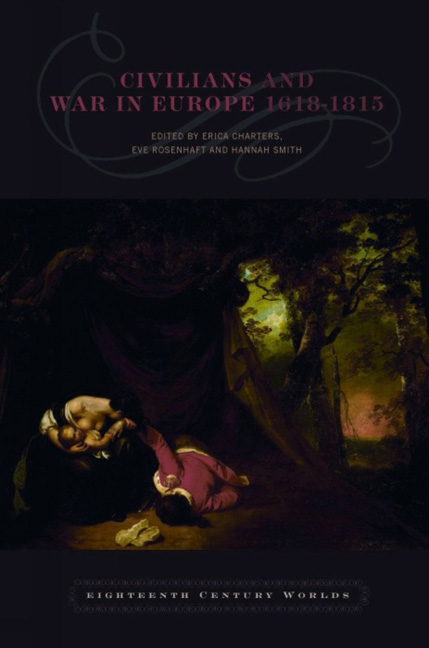Book contents
- Frontmatter
- Contents
- List of Contributors
- Acknowledgements
- List of Illustrations
- List of Abbreviations
- 1 Introduction
- Part I Suffering, Reconciliation and Values in the Seventeenth Century
- 2 Was the Thirty Years War a ‘Total War’?
- 3 Grotius and the Civilian
- 4 War, Property and the Bonds of Society: England's ‘Unnatural’ Civil Wars
- 5 Transitional Justice Theory and Reconciling Civil War Division in English Society, circa 1660–1670
- Part II The State, Soldiers and Civilians
- Part III Who is a Civilian? Who is a Soldier?
- Part IV Contradictions of the French Revolutionary and Napoleonic Wars
- Bibliography
- Index
3 - Grotius and the Civilian
from Part I - Suffering, Reconciliation and Values in the Seventeenth Century
- Frontmatter
- Contents
- List of Contributors
- Acknowledgements
- List of Illustrations
- List of Abbreviations
- 1 Introduction
- Part I Suffering, Reconciliation and Values in the Seventeenth Century
- 2 Was the Thirty Years War a ‘Total War’?
- 3 Grotius and the Civilian
- 4 War, Property and the Bonds of Society: England's ‘Unnatural’ Civil Wars
- 5 Transitional Justice Theory and Reconciling Civil War Division in English Society, circa 1660–1670
- Part II The State, Soldiers and Civilians
- Part III Who is a Civilian? Who is a Soldier?
- Part IV Contradictions of the French Revolutionary and Napoleonic Wars
- Bibliography
- Index
Summary
An enemy, then, who wishes to show respect not for what human laws permit him to do but for what is his duty and what is right and godly, will spare the blood of his adversary. He will sentence no one to death unless by so doing he escapes death himself or something like it, or because his enemy has committed crimes which measure up to capital offences. And even to some who deserve such punishment he will extend pardon, either in full or from the death penalty, moved perhaps by the promptings of humanity, perhaps by other good reasons…
As for the killing of persons who are slaughtered incidentally, without intention, we must maintain what we said above, that mercy, even if not justice, requires that except for grave reasons affecting the safety of multitudes, nothing should be done that may threaten the destruction of innocent people.
HUGO GROTIUS (1583–1645) has long been regarded as a founding figure of modern international law. In particular he is credited with the secularisation of the natural-law approach: ‘Grotius finally excised theology from international law,’ writes Shaw, ‘and emphasised the irrelevance in such a study of any conception of a divine law.’ More recently he has been studied as a seminal political theorist of the early modern period who began the investigation of violence and accountability that was to be continued by Thomas Hobbes and John Locke: ‘seventeenth-century social contract theory is better seen as a conversation among Grotian thinkers than as a quarrel between “Leviathan” and constitutionalism’, suggests Baumgold. A consequence of such views of Grotius's contribution to international law and political theory is that the role that Christianity plays in his outlook is downplayed. This chapter has two aims. First, it sets out the ideal as regards the treatment of civilians in war as enunciated by Grotius in the early years of the Thirty Years War. Secondly, this chapter pays attention to the role that Christianity plays in Grotius's endeavour to limit the harm of war through the construction of a multi-faceted pro-peace ideology.
- Type
- Chapter
- Information
- Civilians and War in Europe 1618–1815 , pp. 36 - 51Publisher: Liverpool University PressPrint publication year: 2012

